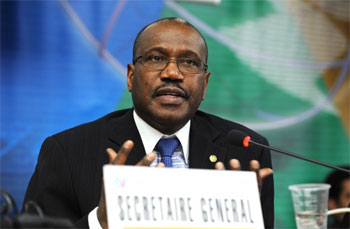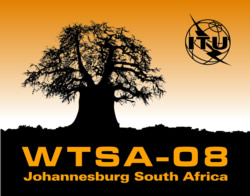|
Geneva, 20 April 2010 |
Not an official record |
N°5 |
|||||
| Next » | |||||||
|
Preparing the World Conference on International Telecommunications in 2012
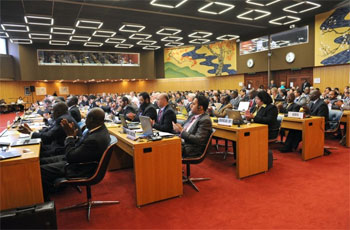 In its Resolution 146, the
Plenipotentiary Conference (Antalya, 2006) called for
a World Conference on International Telecommunications to be convened in 2012
(WCIT-12). Its task would be to review the International Telecommunication
Regulations (ITR). In its Resolution 146, the
Plenipotentiary Conference (Antalya, 2006) called for
a World Conference on International Telecommunications to be convened in 2012
(WCIT-12). Its task would be to review the International Telecommunication
Regulations (ITR).A working group of the Council was set up to prepare this conference by Resolution 1312 (Council 2009). The group has met twice since Council 2009, and has considered the documents brought to its attention by the Council, as well as contributions from administrations. At these meetings, the group discussed the dates and the agenda, as well as the timetable for its preparatory meetings (see Document C10/32). Presenting the group’s report to the Plenary on 20 April, Dr Alexander Kushtuev highlighted several proposals. The group has proposed that WCIT-12 take place in the period 5-30 November 2012, back-to-back with the World Telecommunication Standardization Assembly (WTSA). In addition, the group has suggested that WCIT-12 should last from five to ten working days, depending on the degree of preparatory work. It also proposed an agenda for WCIT-12. Dr Kushtuev then underlined that some divergences remain:
What are ITRs? The International Telecommunication Regulations are one of the four treaties of ITU, the other three being: the Constitution, the Convention and the Radio Regulations. ITRs are a successor to a long line of treaties, going back to the original ITU Convention of 1865. The current version was adopted in 1988 in Melbourne, Australia, by the World Administrative Telegraph and Telephone Conference (WATTC). A previous version was a combination of two treaties: Telegraph Regulations and Telephone Regulations (1973). 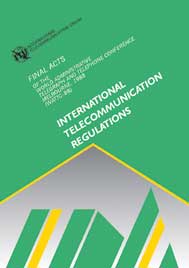 As a treaty-level instrument, ITRs set out the framework and general
principles governing the exchange of international telecommunication
traffic in the broader information and communication technology (ICT)
sector. They facilitate global interconnection and interoperability;
they underpin harmonious development and efficient operation of
technical facilities and they promote efficiency, usefulness, and
availability of international telecommunication services. ITRs contain
provisions relating, among other things, to the international network,
international telecommunication services, charging and accounting,
suspension of services, dissemination of information, and special
arrangements. As a treaty-level instrument, ITRs set out the framework and general
principles governing the exchange of international telecommunication
traffic in the broader information and communication technology (ICT)
sector. They facilitate global interconnection and interoperability;
they underpin harmonious development and efficient operation of
technical facilities and they promote efficiency, usefulness, and
availability of international telecommunication services. ITRs contain
provisions relating, among other things, to the international network,
international telecommunication services, charging and accounting,
suspension of services, dissemination of information, and special
arrangements. Since coming into force on 1 July 1990, ITRs have facilitated the rapid growth of international telecommunication traffic throughout a period of rapid liberalization in many countries and established industry norms and practices, for example, the settlement of traffic, resolution of unpaid bills and carriers’ responsibility for content. Many of these still apply today to commercially-negotiated arrangements between telecommunication operators and carriers. But given that ITRs have remained unchanged since they were signed in 1988, are they still relevant in the face of rapid technological change, notably convergence and the transition to all Internet Protocol-based networks? Do ITR provisions belong elsewhere, for example, in the Constitution, the Convention, or in ITU-T Recommendations? Should provisions be added to the treaty to cover new issues? Member States table their contributions Presenting its Document C10/40 on the preparation of WCIT-12, the United States noted that according to the most recent statistics available, during 2008 only approximately 6 per cent of the international telephone traffic billed in that country was settled following provisions outlined in Article 6 of the ITRs, compared to 86 per cent during 1998. The councillor went on to underline that the “overwhelming majority of international telephone traffic was settled under commercially-negotiated arrangements”. He added that “other countries have experienced this same trend away from settled traffic under Article 6 of the ITRs to traffic settled under commercially-negotiated arrangements”. The United States also presented Document C10/50, which contains a report on WCIT-12 preparation from the Member States of the Inter-American Telecommunication Commission (CITEL). Both the United States and CITEL indicate that most of the provisions of the ITRs are duplicated in other instruments of ITU or in Recommendations. They argue that WCIT-12 is a treaty conference to address the possible revisions to the ITRs. They say that to that end, WCIT-12 should address only the provisions of the existing ITRs. To correct or not Council Resolution 1312 This view was supported mainly by the Philippines, which presented its arguments in Document C10/60. But on the whole, the Philippines said they still see “the need for an International Telecommunication Regulations and the relevance of the purpose behind the Melbourne Treaty in achieving today’s goal of building one global village, a global information society in a fast-changing telecommunication/ICT environment”. But the question is “must the ITR be a treaty or not?”, the delegation said, adding that the Philippines is currently deliberating on this issue. Meanwhile, they were interested in hearing the views from the membership. For the Russian Federation, and many other countries, Council Resolution 1312 was adopted in full compliance with the ITU Constitution and Convention. The delegation went on to propose that the working group should, to a large extent, “be a prototype based on the ITU-R Conference Preparatory Meeting in terms of preparing the technical and regulatory bases for the future WCIT‑12”. Generally, the Russian Federation considers that the main task facing WCIT-12 in reviewing the ITRs is to develop a regulatory instrument that is binding. This, the delegation argued, makes WCIT-12 fundamentally different from other meetings and conferences whose decisions are not binding on all ITU Member States. “Therefore, the content of the regulations in question will have a significantly greater impact than, for example, any technical document adopted in the study groups. Accordingly, the content of the ITRs must be issues that are key to current and future telecommunication technologies and services on a global scale, the Russian Federation explained in its Document C10/59. Comments from the floor Conclusion After several other interventions, the Chairman summed up the debate as follows: We have support that the group on WCIT-12 will meet on 23 April 2010 to prepare the report to PP-10 based on the first two pages of Document C10/32. There is full agreement to set the dates of WCIT-12 associated with WTSA-12, and the agenda, as proposed in Document C10/32. I propose to set up a drafting group to prepare a Council Resolution, which will be presented in Plenary on 22 April. Malcolm Johnson, Director of ITU’s Telecommunication Standardization Bureau (TSB) added that as the Secretary-General pointed out, “we need to involve as many members as possible in the preparations for the WCIT – this is why we offer fellowships and remote participation mechanisms. Holding the WCIT back-to-back with the WTSA would involve a lot of savings – same time, same place, it would avoid a double effort. In the same way the regional preparatory meetings could address both the WTSA and the WCIT. If this is acceptable, I think this could be a good way forward”. It was so agreed. Conformance and interoperability testing
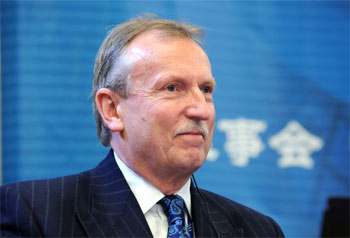 Malcolm Johnson, Director of ITU’s Telecommunication Standardization
Bureau (TSB) reported on progress made in implementing these
recommendations. Before presenting his report (Document
C10/15R1), Mr
Johnson made the following two points: Malcolm Johnson, Director of ITU’s Telecommunication Standardization
Bureau (TSB) reported on progress made in implementing these
recommendations. Before presenting his report (Document
C10/15R1), Mr
Johnson made the following two points:
The Director of TSB announced that TSB was establishing a calendar of “informal” interoperability events, some in partnership with interested SDOs/forums/consortia. The first such interoperability event is to take place on 20-23 July 2010 to test ITU-T’s standards for IPTV (Internet Television). There is no plan to launch an interoperability database. It will be for the participating companies to determine the form in which the results are presented.
The fourth action: implementation of the proposed
recommendations to assist establishment of test facilities in developing
countries
The Director of TSB concluded that it had also been proposed to Council and agreed that a business plan for the long- term implementation of these action lines would be developed, once the level of demand for these action lines has been determined. He said that TSB had begun work on the framework of this business plan which would provide the environmental background; the pros and cons of acting on Resolution 76; a road map for the implementation of the actions; a budget; legal aspects; study group actions; and partnerships for taking the work forward. Presentation of contributions from Member States The Chairman then invited the United States, Italy and Germany/Sweden to present their documents. The United States said in Document C10/49 that ITU must take specific action to bridge the standardization gap through hands-on, targeted training efforts. In achieving all of these aims, the United States believes ITU must maintain and promote the central role of the private sector. It also supports calls for a “step-by-step” approach to first identify the nature of the interoperability and conformity problems in each region before taking the further step of implementing the TSB Director’s recommendations to Council 2009. The United States believes that a business plan that identifies costs and potential liabilities must be completed prior to launching of the proposed ITU-T database. The United States added that the topic of conformance and interoperability testing would also be discussed at the upcoming WTDC-10. Italy (Document C10/48) supported the current implementation of the programme. Italy had carried out an in-depth analysis on some specific aspects of the “ITU Conformity database process” for which concerns have been raised from WTSA-08 up to now. In its contribution, Italy underlined the results of this analysis and concluded that the concerns were unjustified. Germany/Sweden (Document C10/64) had submitted a contribution, following comments from European manufacturing companies regarding the ITU Programme on the implementation of conformity assessment and interoperability testing. Germany/Sweden said that companies consider as costly the proposed plans for the creation of conformance assessment test facilities and Interoperability and Conformity databases with third party testing in accredited test houses. Germany and Sweden proposed to help TSB organize a workshop on this topic in order to address the needs of the developing countries and to further elaborate issues to identify a feasible way forward to fully support these countries. Discussion and conclusion
The TSAG Chairman pointed out that the subject had been discussed at length at the recent TSAG meeting in February 2010, where many views were expressed. He said that meetings of TSAG and other mechanisms (JCA-CIT) would service a useful means to report on issues; that ITU-T was interested in forming partnerships; and that the success of the programme would depend on the collaboration of all parties. Egypt, on behalf of the Arab and African countries, voiced strong support for the implementation programme launched by the Director of TSB and emphasized the need for all recommendations to be executed in parallel, as a step-by-step approach would inevitably lead to delay in implementing Resolution 76. The proposal from Germany and Sweden for a workshop was welcome provided it concentrated on the implementation of solutions and not on further investigation of the problems. Canada suggested that the Director of TSB convene a meeting with high-level executives of companies on how the three additional components he mentioned could best be added to ITU-T’s work programme. The United States said that the upcoming meeting of Chief Technology Officers would be an excellent occasion to seek a written document from this group on the implementation of Resolution 76. The Republic of Korea said that TTA (Telecommunications Technology Association of Korea) would support ITU in its interoperability events. The Russian Federation encouraged BDT and the Radiocommunication
Bureau (BR) to participate actively in the programme. He emphasized that Resolution 76 address both conformity and interoperability. Conformity did not imply interoperability, but that the chances of interoperability would definitely be higher if equipment had been shown to conform to a standard than if it would fail conformance tests. That is why conformance testing is so important. The demand for a conformity database was simple: people wanted a database on the ITU website where they could see what products had been successfully tested to ITU-T Recommendations. To ensure the credibility of the database, tests must be carried out in an accredited laboratory: first, second or third party; or be accepted by an accredited certification body. Companies would voluntarily input the data directly into the database, but the information would only be made publicly available after TSB received a Supplier’s Declaration. This limited TSB resources and also avoided any risk of errors by TSB in inputting the data. He emphasized that TSB was committed to working in consultation with all members and in collaboration with other SDOs, forums and consortia. For example, just within the last couple of weeks TSB had visited ATIS, TIA, ITI – those are the organizations listed in the contribution of the United States (Document C10/49) to this Council –and several Sector Members in the USA to discuss Resolution 76. These were very fruitful meetings, and TSB was ready to continue this dialogue. TSB had also visited the Interoperability Testing Lab of the University of New Hampshire, a not-for profit organization that has a formidable reputation in the testing field and which would be invited to come to the ITU-T Study Group 15 meeting in June.
The Director of TSB underlined the importance of good participation from developing countries in these events, adding that it would be very helpful if Germany and Sweden, and any other interested parties, could provide some voluntary funding to help towards the cost of hosting these events and to enable TSB to offer some fellowships to ensure good participation. Germany said that Nokia Siemens Networks would not only be able to send experts to these workshops, but would also offer some funding towards fellowships for delegates from developing countries. Mr Johnson thanked Nokia Siemens and also the Republic of Korea for their offer of support, especially since both were already making a significant contribution to the bridging the standardization gap fund. He encouraged others to follow this example. Mr Johnson concluded by confirming that TSB is committed to consulting and collaborating with all the ITU-T membership to ensure the successful implementation of Resolution 76. It is a long and winding road but there is no turning back, he said. The Director of BDT, Sami Al Basheer Al Morshid, also expressed appreciation for the positive tone in the Council on this subject and emphasized that TSB and BDT are working closely together on this issue. The Chairman then concluded that Documents
C10/15 (Rev.1),
C10/49,
C10/48 and
C10/64 be noted and that the workshop proposal was widely
accepted. He said that the steps - as outlined by the Director of TSB,
taking into account the Germany/Sweden workshop proposal, the comments
by the United States, and other comments by the Council - were all going
in the right direction. The excellent comments made during this session
would be reflected in the summary record of the meeting, the Chairman
added. |
|||||||

